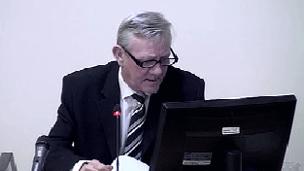Leveson Inquiry: Detective hired to follow Grant
- Published

Much of the evidence referred to during Alexander Owens's appearance was kept private
A private detective was hired by journalists to uncover personal details about celebrities including actor Hugh Grant, the Leveson Inquiry has heard.
Inquiry counsel Robert Jay QC said a "treasure trove" of data was found when Steve Whittamore's records were seized.
Lord Justice Leveson later heard from a former deputy head of the Information Commissioner's Office who denied saying the media was "too big" to take on.
The inquiry also heard about the News of the World's culture of working.
Operation Motorman
The inquiry into media standards was given more details about the documents and electronic records seized from Whittamore in 2003.
They were taken as part of the ICO's inquiry into allegations of offences under the Data Protection Act by the British press, known as Operation Motorman.
Lord Justice Leveson decided it was not in the public interest to display the documents, which were discussed as part of evidence given by the former Information Commissioner's Office (ICO) lead investigator Alexander (Alec) Owens.
Mr Owens was recalled after giving evidence last Wednesday, external.
The inquiry heard that the notebooks revealed that "Grant" and "Hurley" were subject to an area search and a vehicle registration search (VRM).
Mr Owens said: "We went to see Mr Grant at his offices because a VRM comes up against his name. As it turned out he couldn't recall this and possibly thought he may have been in a friend's car or talking to somebody standing by that car."
'Too big' claim
Francis Aldhouse: "It is simply the sort of thing I would not say and does not reflect my views"
Mr Owens reiterated a claim he made on Wednesday that he had urged former ICO deputy Francis Aldhouse and the then information commissioner Richard Thomas to go after the newspapers but that Mr Aldhouse had said the news groups were "too big" to tackle.
Mr Aldhouse later told the inquiry he could not recall the conversation.
He said he had consulted printouts of his old electronic diary and could not find a record of the meeting his former colleague had described. "If there was a meeting it would have been a very casual one and a very short one and certainly not scope for a full briefing," he told the inquiry.
Mr Aldhouse said if he had seen the information on the media's illegal accessing of data as it had been laid out to the inquiry his view would probably have been "we really ought to find a way of pursuing this".
He said Mr Owens's claim that he had said the media was too big was "simply not my view. Certainly not the language I would have used".
He said he did not fear the media and that the comment attributed to him by Mr Owens did not reflect the way he had dealt with the media.
Mr Aldhouse said that he had not run Operation Motorman - his focus being more on policy work. "I supervised the person who ran the investigations department," he said.
"Richard Thomas decided that he wanted to pursue the route of going to the PCC and writing to Sir Christopher Mayer," Mr Aldhouse said. "It's for the commissioner to decide how he runs the office. And it's worth considering that the commissioner is a one-man band and if the commissioner decides to take a route, so be it."
Fake sheikhs
The inquiry later heard from the author of the book News of the World? Fake Sheikhs and Royal Trappings.
Peter Burden said the culture at the newspaper did not demand "the relevance of truth".
"The notion that running a story that was going to do considerable harm to somebody - even though no illegality was involved - was irrelevant to them. They didn't care how much harm they did. Indeed... the more damage they did the better."
Former NoW journalist Mazher Mahmood carried out a number of investigations for the paper using a "fake sheikh" disguise. His targets ranged from the Countess of Wessex to former England football manager Sven-Goran Eriksson and the NoW claimed he brought about the conviction of more than 250 criminals.
Mr Burden said that as time went on it appeared to become easier for Mr Mahmood "to take the bare bones, the scintilla of a story, and turn it into a much bigger story". He said that a story about a plot to kidnap Victoria Beckham "was based on nothing at all other than Mazher Mahmood's inventiveness".
Some stories, he said, led to people being arrested and locked up on remand, before the case against them collapsed.
Mr Burden told the inquiry that a statutory body should replace the Press Complaints Commission (PCC). He said politicians who chose not to give the PCC statutory powers "were those who were frightened of the press".
Lord Justice Leveson's inquiry is looking at the "culture, practices and ethics of the media" and whether the self-regulation of the press works.